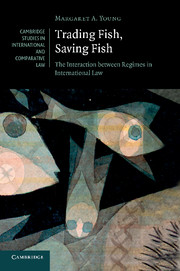Book contents
- Frontmatter
- Contents
- Foreword
- Acknowledgements
- Table of cases
- Table of Conventions, Declarations and procedures
- List of abbreviations
- Part I Trading Fish, Saving Fish
- Chapter 1 Introduction
- Chapter 2 Relevant laws and institutions: an overview
- Part II Selected Case Studies
- Part III Towards Regime Interaction
- Appendices
- Bibliography
- Index
- CAMBRIDGE STUDIES IN INTERNATIONAL AND COMPARATIVE LAW
- References
Chapter 1 - Introduction
Published online by Cambridge University Press: 28 April 2011
- Frontmatter
- Contents
- Foreword
- Acknowledgements
- Table of cases
- Table of Conventions, Declarations and procedures
- List of abbreviations
- Part I Trading Fish, Saving Fish
- Chapter 1 Introduction
- Chapter 2 Relevant laws and institutions: an overview
- Part II Selected Case Studies
- Part III Towards Regime Interaction
- Appendices
- Bibliography
- Index
- CAMBRIDGE STUDIES IN INTERNATIONAL AND COMPARATIVE LAW
- References
Summary
International law is a legal system.
International trade law, international environmental law and the law of the sea have been conceived and developed, for the most part, independently. States have agreed to the progressive multilateral liberalisation of trade through the auspices of the GATT, later the World Trade Organization (WTO). They have addressed environmental issues such as the protection of biological diversity through a range of multilateral environmental agreements known collectively as MEAs. The use of ocean resources has been negotiated in various instruments grouped under the ‘law of the sea’, culminating in the United Nations Convention on the Law of the Sea (UNCLOS) and related agreements. Meanwhile, collective action to ensure freedom from hunger has focused on the utilisation of fisheries and marine products as major goals of the UN Food and Agriculture Organization (FAO). Thus have arisen separate ‘regimes’ of laws and institutions.
But global problems do not fall neatly within a single regime. The emerging worldwide crisis in fish stocks calls for diverse international legal and political responses. Scientific studies have emphasised that global fisheries are at real risk of collapse. An adequate rate of replenishment of fish, as was commonly achieved pre-industrialisation, is now usually exceeded by catch capacity. Scientists have projected the collapse of seafood-producing species stocks by 2048, and have noted that 63 per cent of assessed fish stocks worldwide require rebuilding, and even lower exploitation rates are needed to reverse the collapse of vulnerable species.
- Type
- Chapter
- Information
- Trading Fish, Saving FishThe Interaction between Regimes in International Law, pp. 3 - 31Publisher: Cambridge University PressPrint publication year: 2011
References
- 1
- Cited by



